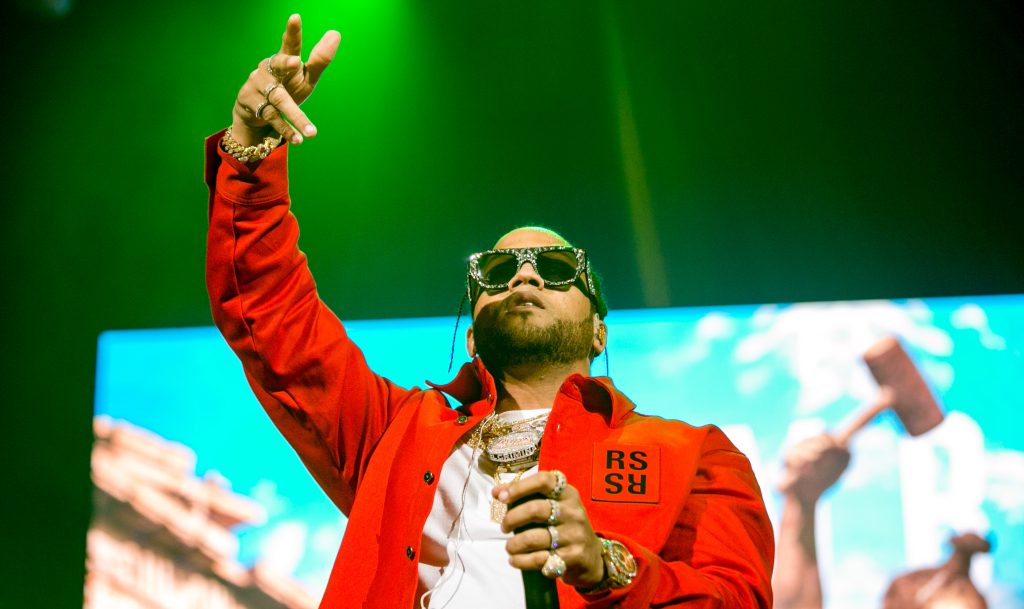Soundtracked by the 20th Century Fox intro as he descended from the ceiling, thousands of fans below him, El Alfa’s first-ever performance at the iconic Coliseo José Miguel Agrelot de Puerto Rico seemed fated to fulfill, or even surpass, all its lead-up hype. But from that dramatic beginning, the show gradually wound down, rather than up.
By midnight, a mass departure of concert goers was well underway. El Choli (the venue’s nickname) was clearing out, as the long-established Dominican urbano star El Alfa had ended his show uncharacteristically early by typical venue standards. Leaving the coliseum grounds, many faces showed confusion, frustration. There were even fans who, expecting the event would begin later than its 10 p.m. start time, didn’t see the full show – or arrived too late, missing his set entirely.
“They started early and they ended early. It’s not even midnight and the concert’s over,” complained Fernando Enrique, 19. “A lot of people were disappointed by that. But let’s hope he comes with something better next time – so as not to say it was una porquería.”
The brevity of El Alfa’s appearance wasn’t the only complaint from attendees, unfortunately. Hopes that Bad Bunny might deliver “La Romana” from X100PRE, on which El Alfa guests – or maybe even on “Dema Ga Ge Gi Go Gu,” a track from 2016, where the invitation situation was reversed, early in Bad Bunny’s career – were left unfilled.
Other Puerto Rican artists – Farruko, Myke Towers, Zion y Lennox, Tito el Bambino, and Noriel – who’ve collaborated with El Alfa did take the stage. He also pulled in Secreto and Shelow Shaq, fellow Dominicans.
Puerto Rico-based YouTuber Gilda Santos says that mutual support among urbano artists in her native Dominican Republic is scarce. “There’s a lot of ego,” she says, adding that she was happy to see the solidarity in action. Additionally, she notes, El Alfa has caught a lot of flack for collaborating with Puerto Rican artists.
“Dominican culture doesn’t permit so much support from a Puerto Rican to a Dominican, because over there, if someone supports you, eres un lambo, estas buscando pauta. El Alfa was heavily criticized when he first started recording with Puerto Rican artists because that’s what they’d say. The culture over there is like that,” she says. “They’re saying no, you’re just working with them para pegarte. But on my part, I understand the collaborations he’s done have been good, and they’ve helped him a lot – Puerto Ricans have helped his career grow. Especially Bad Bunny, who took him along almost all of his tour.”
Countless times, El Alfa expressed gratitude for the fans present – and for the artists who’ve helped elevate his career, too, even taking a moment to gift Farruko a giant chain, pulled from the super-shiny backpack he’d been wearing since the show’s start.
Between songs, his multiple requests for cheers – if you’re proud to be Puerto Rican, if you’re proud to be Dominican – were answered loudly. But that volume decreased over time. El Alfa never got silence in return, of course, but the enthusiasm in the crowd’s response seemed to fizzle.
The population of Dominicans living in Puerto Rico is an estimated 100,000, with about 75percent living in San Juan. Xenophobia from native Puerto Ricans toward the migrant group is very much real; colorism plays a role in this discrimination, and violence is a worst-case result.
That El Alfa’s concert, complete with Puerto Rican stars guesting, might offer some magical coming together of two Caribbean peoples proved to be a pipedream. Yes, the crowd was there, together – but when El Alfa was singling out Dominicans, asking that community specifically to cheer in pride, there were a lot of faces in the crowd looking around, as if trying to distinguish who was who.
That’s only speculation, of course. But it’s fact that El Alfa offered no commentary on the issue. At best, he delivered platitudes about pride, and unification under God.
Santos seemed to wonder who exactly El Alfa was catering to in his setlist choices. “The people who were [at the concert] were mostly Dominicans,” she adds. “They’ve followed his career, and they know his other songs.”
Disheartened by the set length, and the choices within it, she also referred to “La Romana”: “He really abused that song. He sang it three or four times in the concert. He opened with it, in the middle he sang it again, then again at the end.”
“Suave” got a similar, albeit less heavy-handed, treatment. The crowd was treated to favorites like “Banda de Camión” (2016) and recent hits like “Jalapeño,” trap-leaning “King Kong,” and “Qué Calor,” a Major Lazer cut on which he guests alongside J Balvin. But with so vast a catalog to cull from, there were some obvious hits missing.
Santos was particularly befuddled by the absence of “Dembow con Reggaeton” and El Alfa’s inaugural 2012 hit, “Muevete Jevi.”
Beyond the song selects, something felt off during the show; El Alfa was chugging water constantly, and his voice faltered on occasion. Santos thinks he might have been sick. In recent years, presumably for lack of sales or other issues, he’s canceled scheduled shows in Puerto Rico. Had he postponed, it would’ve been his third setback with fans based on the island.
Regardless, while some upper seating was closed off, urbano outlets and fans are classifying El Alfa’s show as sold out. And it was, after all, an energetic one: El Alfa ran circles around the massive stage while rapping as rapidly as he does on recordings. It’s hard to complain about the show’s abrupt ending – nope, there was no encore – with his dynamic performance in mind, as well as the chance that he could have been dealing with throat issues.
“I have to feel proud, and applaud him,” Santos says. “I hope he can keep coming back, and that he brings other artists. I want to see more Dominican artists.”







